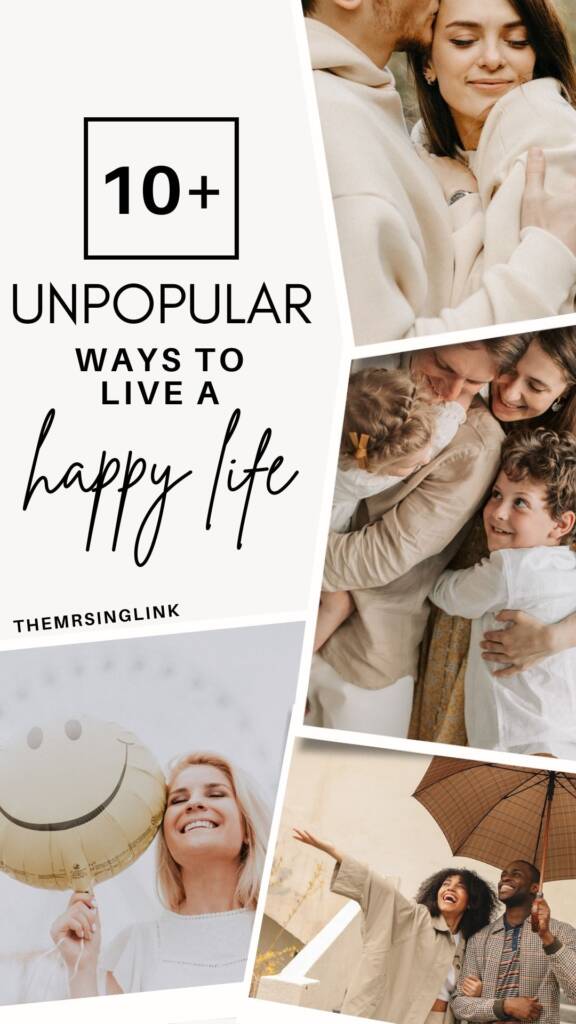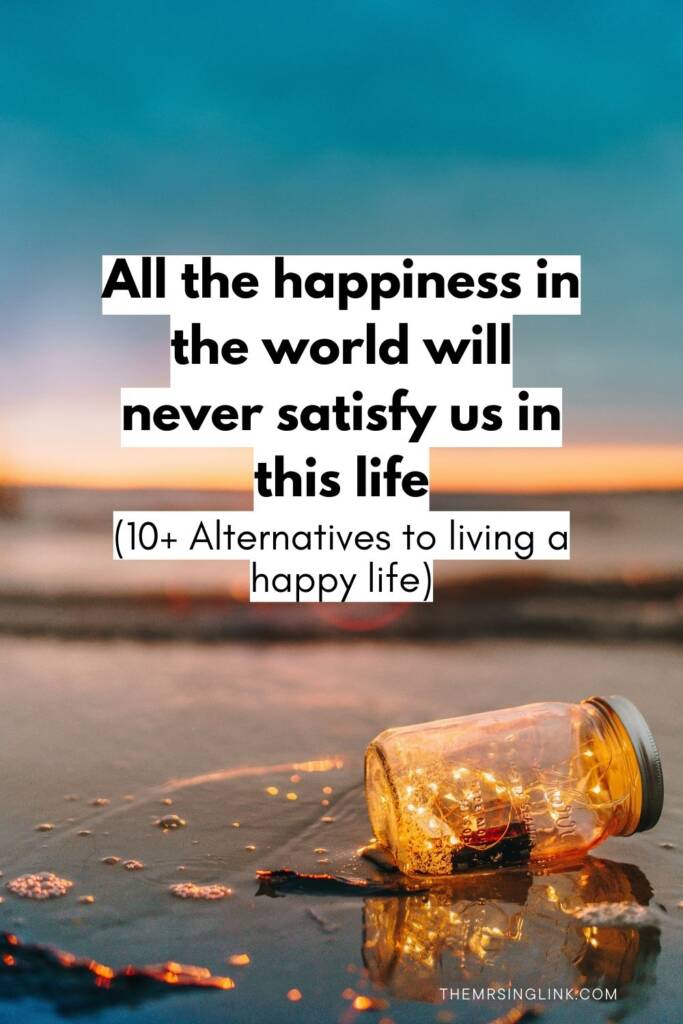We live in a world where happiness and to live a happy life is the goal. We’re always seeking and striving for it. Oftentimes we find it until we don’t have it anymore. But only those who truly understand know that happiness is not a constant, and it cannot be *bought*. At the end of the day happiness will never fully satisfy us in this life, and for many this requires a mindset shift.
I think we like to think that happiness and being happy means we won’t experience unhappiness and suffering, or that we can’t experience both at the same time. Actually, you can. When we do experience unhappiness or suffering, we allow that to out measure or cancel out happiness. We all do this. For instance, a bad day at work overshadows your whole week, including the day your co-worker surprised you with coffee, the exciting news you received from a friend, and that new recipe you tried and nailed the first time around.
The main points in this post..
Happiness almost then becomes an addiction because we not only feel like we have to work so hard for it but that this work is continuum just to maintain (even to the point of burnout, anxiety or depression). Let’s be real, we even experience complacency in happiness. Soon enough, it will feel like next to nothing is ever enough, or at least not for long.
Honestly, personally, IMO, we ourselves are much to blame, especially in a world where we’re all interconnected online now more than ever. We’re always in this state of raising the bar or standard, keeping up with the Jone’s, believing false narratives about ourselves, living in a total and constant state of envy and comparison, mistaking what true wealth and luxury is, as well as being exposed to and engaging in a world from a self-serving angle that preaches glamorized prosperity.
We’re always wanting and seeking more happiness. So I have a few rather *unpopular* alternatives to live a happy life (style) today.

10+ Unpopular ways to live a happy life
Seek contentment
By online definition, contentment is actually a synonym for happiness. For me, seeking contentment is less about finding happiness (fulfillment, satisfaction, indulgence, gratification, etc.) and more about being at peace. Even Psychology Today highlights contentment, saying, “..contentment is the feeling of being OK with the way things stand – being comfortable with life.” For me, I often find that happiness comes in jolts with a short-lived high (and highs tend to crash), whereas contentment is more of a low-key but steady sense of relief.
There’s still some truth to how we might define contentment from a more worldly perspective – mediocre, complacent, compensating, simple-living, low-maintenance, disciplined, unchanged, unaffected (by influence), lowly, and present-minded. Nevertheless, I think it’s important not to confuse contentment for happiness because I believe contentment is a heart matter (on the inside) and is rather contrary to our human nature.
It’s way easier to seek happiness – it’s self-benefitting – whereas contentment requires something of us we aren’t necessarily ready or willing to embrace. Seeking happiness is when the immaterial portion of contentment is no longer sufficient because happiness says, “You can have *everything*, and you will feel good/better,” while contentment says, “You *can* have everything, but ultimately it won’t make you feel better.” In other words, happiness is the short-term fix we gravitate to for discontent.
EX. Appreciate the job you have
Listen, I’m not telling anyone not to take the promotion or to stay at their dead-end job they absolutely hate where they’re treated like dirt. What I am saying is that these days it is difficult to find and maintain a decent job with decent, steady pay. Besides, if you thought the workforce would be smooth sailing with all good days and only dealing with level-headed, friendly people all the time, you might be the one insane.
Today, many people’s jobs are their alternate (or sole) identity – the mentality of living to work is real, when I whole-heartedly believe it needs to be the other way around if we are to find contentment.
All I’m saying is sometimes we have to step back and consciously be more grateful for simply having a job (including the ability to easily find another if we wanted). This doesn’t negate unfairness, because there sure is in every job, but if the one thing that takes up more than half your time in life is received with a miserable attitude…how difficult will it be to find contentment in the other half of your time?
EX. Be content with what you have and can afford
From a superficial and financial standpoint, to be content means not anticipating or expecting more than you can afford. To be content is to be satisfied without requiring more, or better; it is also to kill or dismount those desires.
As much as more or better is part of that pleasure-filled drive we all have, this can also be destructive and addictive in all the wrong ways, too. We should be able to consider what aspects might be interfering with finding and maintaining contentment in our lives. Most of this usually boils down to status quo and money, so it should be fairly easy and predictable.
To be content with what you have and what you can afford does not mean you aren’t deserving of your basic needs being met and necessities for a quality of living. For instance, there’s a clear difference between wanting to buy a new car every five years because you’re bored with the one you have and investing in an array of supplements every month to benefit your health.
Yet there is good reason for the uptick in the minimalist lifestyle, both from a material and financial standpoint. It’s less about denying our needs and wants and more about keeping our unnecessary wants and needs in check. Contentment is about not needing to submit to our every desire, simply because we can or want it.
Unfortunately, far too many want to live a happy life wrapped up in consumerism, and are either ignorantly or willingly missing this point altogether.
Other Examples of Seeking Contentment
EX. Stop feeling like you have to solve every problem, having it all together 24/7, or always having a plan(s)/back-up plan(s)
EX. Appreciate more of the *little things* in life over the *big things*
EX. Set yourself apart from the world (others) and *worldly things* (Especially as a way to feel included or accepted)
EX. Take strides or steps to quiet the inner noise or voice that invites temptation or goes against contentment (i.e., Stop listening to the world when it tells you your value is in your career and how much money you make)
EX. Avoid submitting to forms of *escapism* (You won’t find contentment in a false reality)
[pt_view id=”23d21e0pc0″]
Simplify
This word can have multiple meanings and applications. To simplify can mean to minimize or remove certain things from your life, or your *plate*. Simplification can be an alteration or change in mindset – letting go, unpacking old wounds, releasing bitterness and resentment, or practicing more forgiveness. It can also be a freeing action or turning point – turning down a job promotion that pays more but is more demanding of your time and energy, or leaving an environment that requires or tempts you to succumb to material possessions or addiction.
Simplifying your life can mean less all around, though it certainly doesn’t mean neglecting your life and needs. But what usually happens when we overfill our plates, constantly? Or when we never finish or clean our plates before adding on more food? Yes, I’m using this as a literal example, because I think it works.
1. We overeat, which means our bodies struggle or are no longer able to tell us we’re full – we eat beyond when our body tells us to stop (bad, bad habit) or our bodies stop telling us altogether, which leads to digestive issues down the road. To simplify does mean reduction or to portion out more wisely, but no, I’m not saying to starve yourself.
2. A never finished plate means never reaching or allowing ourselves to know what it feels like to be satisfied. And if we never feel fully satisfied then it’s because we’re usually trying to avoid feeling any potential dissatisfaction [hunger] altogether, which can actually make us more anxious and exhausted (fatigued). Again, happiness means never allowing your plate to be empty, because we’re conditioned to thinking that’s bad.
3. When we don’t allow ourselves time in between meals (meaning, we can’t function on an empty plate for too long), we also never fully or properly digest. When we indulge in happiness, do we typically respond with appreciation and gratefulness or are we likely to lean on our worthiness and achievements? Do we count our blessings…orrrr do we lean on our feelings and blame the universe? Our bodies hardly get to experience hunger because we never allow it the opportunity. So maybe, just maybe, if we experience hunger we’ll have more appreciation for the food when it does appear on our plate. This is similar to never allowing ourselves to feel bored, so we live in such an overstimulated, distracted and productive state.
4. A plate that is never washed or disinfected – well, you get the jist – is eventually riddled with bacteria and mold (poor habits, negative thought patterns, poor attitude, unhealthy behaviors and choices). This is obviously harmful all around, and potentially lethal. Plus, we already know, some of the *happiest* individuals are the most unhappiest; suffering depression, having estranged or damaged relationships or are just blatantly miserable (they hurt themselves and others) aside from their external mask of success and material possessions. Bottom line is if your plate is always dirty you’ll inevitably struggle to live an authentically happy life.
EX. Curb the number or amount of things taking space in your life
Again, to simplify can mean to minimize. When referring back to the minimalist lifestyle, I think the trend often receives the ick because it implies people to live off less and occupy less space. I do understand how that can be icky, but I think it’s much easier to understand when you consider the plate example above.
As far as the things taking up space in your life, it is important to note that this doesn’t mean we should just go on a cleaning spree, up and quit our job irrationally, or all willy-nilly cut everyone out of our life. We are to be more careful and mindful, but the point being to take into account the number or amount of these things – sometimes there are things in life that need scaling back rather than removal entirely, so it’s important to discern the difference.
EX. Refrain from oversharing, overextending and going overboard
You know what has dramatically changed my ability to experience contentment? Simplifying from a personal standpoint. For instance, if we overshare on social media, to coworkers or friends and family, we might find contentment in keeping more things private.
It’s like the saying goes, “Less is more,” or “Quality over quantity.” I believe this applies to living a happy life, too.
Particularly, for me, oversharing, overextending and going overboard were just a few of my weak points that were affecting my contentment. And these may not be the same for you, so it’s up to you to find yours.
Simplifying, in this sense, meant actually listening to my body, processing my head space, and allowing myself grace in the times I am most prone or tempted to overshare, overextend and go overboard (overthink, overachieve, over perform, etc.). Therefore, to simplify meant saying “No” without having to come up with a good reason or excuse, feeling the weight or guilt of not being caring and loving enough, or to doing something beyond my capacity to the point of exhaustion.
I found contentment and healing within myself that all the Self-Help and therapy wasn’t able to provide, *and I have Jesus to thank for that.
Other Examples of Simplifying Your Life
EX. Learn, embrace and carve out time for *rest* instead of over-productivity
EX. Unlearn certain unrealistic and glamorized ideologies (Falsified definition of Love and “romance”)
EX. Live out a more modest lifestyle (Quiet, mundane, simple)
EX. Redefine what it means to live a subjective life of *luxury* (Luxury isn’t just lavish treasures and unlimited stability – i.e., it’s a luxury to own a car/house that’s paid off, to eat three solid meals a day, to go on [any] vacation once a year, to have family who loves you unconditionally, to be able to work remote or from home, to wake up not in debilitating pain, etc.)
Smooth any stubborn, callous areas
You know those rough patches you can get on your hands, such as from hard work digging or raking in the yard? These are often viewed as a sign of toughness, proof of determination, and skilled experience. Or, many times, people get calloused heels, where the skin is thick and hardened over; this skin, when left untreated, eventually loses all feeling and sensation, and can become painful!
Anyway, those are physical callouses. Now let’s think of the word callous – cruel, insensitive, rough, hardened, crass, careless, indifferent, spiritless, insensible, insentient, blind to, unresponsive, etc.. The synonym list is pretty hefty. The point is to smooth over these areas before they get *too hard*, lose feeling and become painful. The other point is that being callous should not be mistaken for strength, resilience, or toughness, either.
These things do/may require acknowledging, accepting, learning/unlearning, and retraining – if you’ve lived with callouses (or callousness) for an extended period it’s easy to be adapted to them (it)!
EX. Step outside the confines of your own little world
Life isn’t simply happening to you – life is happening all around you; it’s happening with you as much as you’re happening to life. Also, each and every life directly and indirectly affects others’, too. It’s far too easy to allow the things that happen to us in life to mold us into those synonyms for callous mentioned above. This goes for circumstances and people – when things don’t go our way or when other’s don’t conform or adhere to our little bubble.
Too often I think we willingly succumb to a world that revolves around us (ourselves). Could this be a way that makes us feel safe? I believe so, because when you step outside the confines of your own little world you begin to realize just how fragile, helpless and meaningless (insignificant) we truly are.
I don’t know, for me, there’s something so hopelessly beautiful about that. I notice that when I’m more conscious about stepping outside my own little world, I’m less affected by life and others (in a positive way), because if my only means is to live within my little bubble then the weight of the outside world and others’ is only bound to crush me.
EX. Refrain from taking offense and/or getting defensive
IMO, there’s two kinds of people when it comes to taking offense or getting defensive. There are those who are more vocal and/or outward (physically) when taking offense, and those who internalize it. It’s not a matter of right or wrong here, but it’s pointing out that we all take offense, get defensive in life and by others.
It’s a guarantee, which means all the more to consider this a promised detriment to our overall wellbeing (mental health, worldview, and capacity to Love others authentically). Basically, we should expect to be offended so we can understand the value of being less affected by offense. I really hope that makes sense like it does for me.
[Related Read: How to Stop Being Defensive (When You Feel Under Attack)]
You aren’t in control of others being offensive, but you can control how or whether it affects you. Today, being offended by everything and anything is an over-saturated market for victimhood – it’s difficult not to see the sheer lack of self-control, sensibility, and restraint. Many people live for being angry, resentful and vengeful – almost seeking it out subconsciously.
Above all, to be in this constant state (of victimhood, taking offense or being defensive) only has negative health impacts on the body and mind – it’s like living in a house made from toothpicks, and you inside live in the vicious cycle of having to rebuild from all the huffing and puffing. Basically, we’re only hurting ourselves.
Other Examples of Smoothing Your Callouses
EX. Unlearn being *nice* (Be authentically kind, instead)
EX. Remove disingenuous language (i.e., “Have the day you deserve”, “Luckily your mother Loves you”, “Bless your heart”, etc.)
EX. Remove yourself from destructive environments (i.e., Stop hanging out with friends that trigger or tempt you into bitterness or gossip)
EX. Extend more grace and forgiveness to others (Holding onto hatred and unforgiveness is like walking through life wearing a backpack filled with boulders – learn and understand the TRUE significance grace and forgiveness has on ourselves and others)

